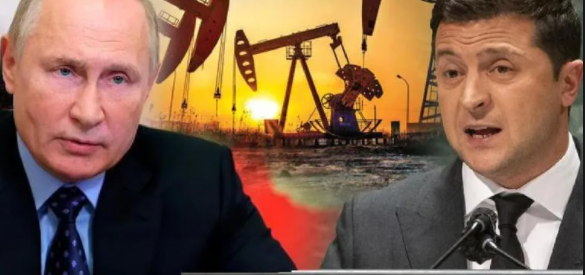Virendra Pandit
New Delhi: Twenty-seven days on, the impact of the ongoing Russia-Ukraine war, and the resultant northward movement of crude prices worldwide, has affected the world economy in a slow, spiraling cycle the way the Covid-19 pandemic roiled the planet after January 2020.
India, which imports almost 85 percent of energy—Russia accounts for less than one percent of it—announced to increase petrol and diesel prices on Tuesday while Fitch sharply slashed the country’s GDP growth forecast for the next fiscal (2022-23) from 10.3 percent by 180 basis points to 8.5 percent. However, the rating agency also upped the growth rate for the current financial year (2021-22) by 60 basis points to 8.7 percent.
These moves came after the European Union’s finance ministers remained divided in Brussels on Monday over the decision to impose fresh sanctions on Russia from where the Continent imports around 40 percent of gas and fuel to run its diverse economies. Some countries strongly favored sanctions on Russia’s oil sector while others, including Germany and Hungary, opposed it, as it would severely affect their energy security.
The EU foreign ministers will now take a decision on Thursday.
After these reports, crude oil futures went up by nearly 10 percent on Tuesday. May Brent oil futures were at USD 118.80, up almost 10 percent, and May crude oil futures on WTI at USD 114.68, up by 2.36 percent, the media reported.
In India, the April crude oil futures were trading at Rs. 8,624 on Multi Commodity Exchange (MCX) on Tuesday morning against the previous close of Rs. 8,331, up by 3.52 percent, while May futures were trading at Rs. 8,435 against the previous close of Rs. 8,163, up by 3.33 percent.
In Brussels, German Foreign Minister Annalena Baerbock said: “The question of an oil embargo is not a question of whether we want or don’t want it, but a question of how much we depend on oil.” Germany and other European countries are importing a lot of Russian oil, and they cannot stop it, she added.
Meanwhile, Saudi Arabia also clarified that it would not bear responsibility for disruptions to the global oil supply following the Houthi attacks on its oil facilities.
Although the US has increased production and demand may remain muted because of the resurgence of Covid-19 in many countries, crude prices are unlikely to fall, the media reported.
In its Global Economic Outlook for March 2022, Fitch said the post-pandemic recovery is being hit by a potentially huge global supply shock that will reduce growth and push up inflation.
“The war in Ukraine and economic sanctions on Russia have put global energy supplies at risk. Sanctions seem unlikely to be rescinded anytime soon,” the rating agency said.
Overall, Russia supplies around 10 percent of the world’s energy, including 17 percent of its natural gas and 12 percent of the oil.
” The jump in oil and gas prices will add to industry costs and reduce consumers’ real incomes…Higher energy prices are a given,” Fitch said as it slashed the world GDP growth forecast by 0.7 percentage points to 3.5 percent.
Fitch also noted that the Indian GDP growth was very strong in the December quarter, and the GDP is over 6 percent above its pre-pandemic level, although it is still well below its implied pre-pandemic trend.
“High-frequency data show that the Indian economy has ridden out the Omicron wave with little damage in stark contrast with the two previous coronavirus waves in 2020 and 2021,” it said.
Fitch now sees inflation strengthening further, peaking above 7 percent by the third quarter of FY23 (October-December 2022, before gradually easing.
The agency expects inflation to remain elevated throughout the forecast horizon, at 6.1 percent annual average in 2021 and 5 percent in 2022.
In India, the government on Tuesday hiked petrol and diesel prices by 80 paise a liter each, while it increased domestic cooking gas prices by Rs. 50 per cylinder, ending an over four and half month election-related hiatus in rate revision.
A 14.2-kg non-subsidized LPG cylinder will now cost Rs. 949.50 in the national capital. A 5 KG LPG cylinder will cost Rs 349 while the 10 kg composite bottle will come for Rs 669. The 19-kg commercial cylinder now costs Rs 2003.50.
While LPG rates were last revised on October 6, 2022, petrol and diesel prices remained frozen since November 4 ahead of the assembly elections in five states, including Uttar Pradesh and Punjab.
Prices have been on a freeze since then despite the cost of raw material spiraling. International oil prices were around USD 81-82 a barrel in early November as against USD 114 now.

